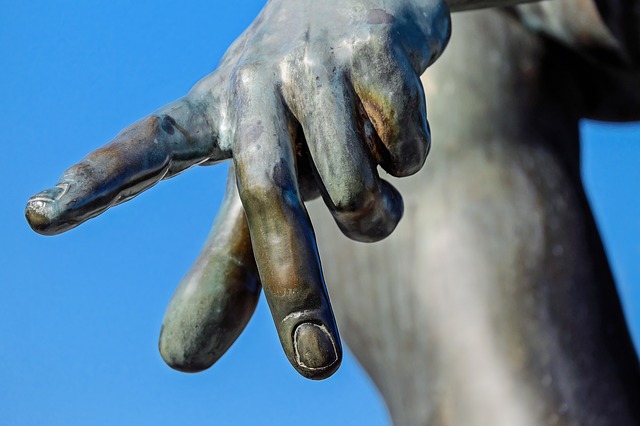Reflecting on the American Presidential election last Tuesday my mind turned to Peggy Noonan’s Wall Street Journal article (11/05/16) that I quoted last week. In particular, note again: But he (God) is an actor in history also. He chastises and rescues, he intervenes in ways seen and unseen…
Perhaps for the first time in Western history, we lightly dismiss the idea of God’s involvement in human affairs. But Peggy Noonan’s words are consistent with how the Bible speaks of God.
In his address to the Athenian intelligentsia Paul says: From one ancestor he (God) made all nations to inhabit the whole earth, and he allotted the times of their existence and the boundaries of the places where they would live, so that they would search for God and perhaps grope for him and find him—though indeed he is not far from each one of us. For ‘In him we live and move and have our being’ (Acts 17:26-28a).
A CREATED UNIVERSE
The universe did not come into existence by random chance, Paul is saying. It’s a rather frightening thought, for it reverses what we want to think about our existence. If God exists, we would rather he did our will, and turned up only when we wanted him.
Furthermore, it’s too easy to say that God is distant or uncaring. ‘Not so,’ says Paul. ‘God is near you – nearer than you think. Quoting from a 6th century BC Greek poet, he points out: ‘In God we live and move and have our being.’ When events in our lives turn out very differently from what we expect, we need to pause and ask, ‘What should I learn from this?’
A MORAL UNIVERSE
Paul concludes his Athenian address with: ‘In the past God overlooked such ignorance, but now God commands all people everywhere to repent. For he has set a day when he will judge the world with justice by the man he has appointed. He has given proof of this to all people by raising him from the dead’ (Acts 17:30-31).
Yes, many today have a problem with the idea of God as judge. However as Winston Churchill observed, there has to be a hell to bring the likes of Trotsky, Stalin and Hitler to justice. And we could add to the list. Paul is saying that in appointing a day of reckoning for us all, God is being just. Indeed, without God’s moral constancy we have no hope of a future of perfect peace.
Elsewhere Paul sums up our human condition: We were by nature children of wrath, like everyone else. But that is not the end of the story for Paul continues, But God, who is rich in mercy, out of the great love with which he loved us… (Ephesians 2:3-4)
Furthermore, he goes on: For by grace you have been saved through faith, and this is not your own doing; it is the gift of God— not the result of works, so that no one may boast (Ephesians 2:8-9).
SOLA GRATIA
How easy it is to gloss over familiar words such as grace and faith. What Paul is saying here is complex, profound yet very simple. For in tying grace and faith tightly together, he is saying that God has done absolutely everything needed for our salvation. God’s grace, and the faith we come to have are divinely initiated and gifted. Our salvation, our reconciliation with God, is God’s work through and through.
This was something men like Luther, Calvin and Cranmer rediscovered in the 16th century. For centuries these truths had been overlaid by the doctrines of merit and good works, penances and payments (indulgences as they became known). It was taught that through these means people might be able to gain some acceptance with God.
But Paul’s, and the Scriptures’ clear teaching is that even the faith we have, is God’s gift alone. Every generation needs to grasp this vital wonder. In our human pride we like to think we can contribute to or offer something in the cause of our salvation. Ironically, this offers us no assurance of salvation.
With Reformers like Thomas Cranmer, we today need to be vigilant, ensuring that liturgies we promote are clear with respect to The Lord’s Supper, for example. Yet in many American churches, Cranmer’s second prayer book (1552 / 1662) is overlooked or simply ignored. Yet, it is this second prayer book – the one for which he died – that clearly and unambiguously sets out the central gospel truths of salvation by grace alone, through faith alone, in Christ alone, revealed in the Scriptures alone.
In his Homily of Salvation (Works, Vol. II, p.130), Cranmer wrote: “Our justification doth come freely by the mere mercy of God, and so great and free mercy at that, whereas all the world was not able themselves to pay any part towards their ransom, it pleased our heavenly Father, of His infinite mercy, without any of our desert or deserving, to prepare for us the most precious jewels of Christ’s body and blood, whereby our ransom might be fully paid, the law fulfilled, and his justice fully satisfied”.
Let’s pray for the Spirit of God to awaken us afresh to heartfelt thankfulness to our God whose nature is always to have mercy.
© John G. Mason

